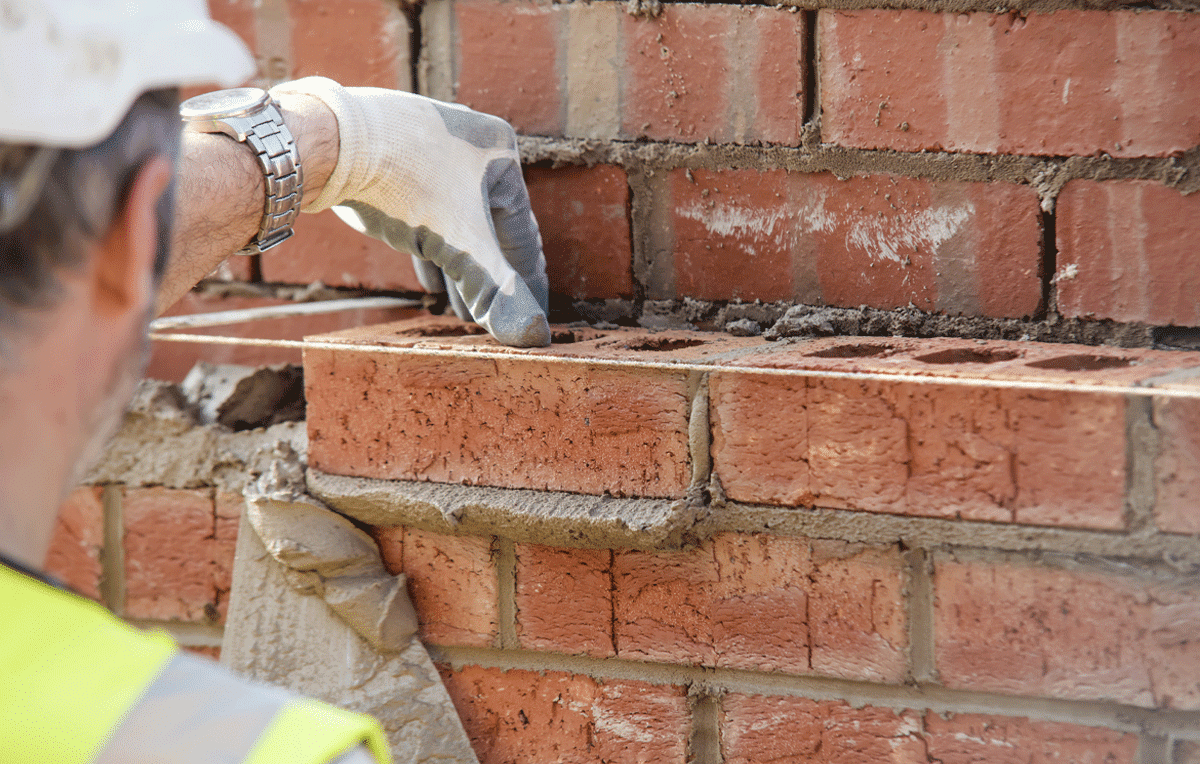We know that building your own home can be a difficult and stressful process. We can’t help with the building, but we have made applying for a self-build mortgage easier than ever, and better still, we offer market-leading self build mortgage rates from 3.95% (4.01% APRC).
Let’s delve into the world of self-build mortgages and unlock the insights you need for a successful project.
What are Self-Build Mortgages and How do They Work
A self-build mortgage is for people who are building their own home, and it differs from a traditional mortgage. Some financial institutions don’t offer self-build mortgages… but we do!
Unlike conventional mortgages, which provide a lump sum payment upon purchase, self-build mortgages operate on a staged release of funds. Typically spanning 4 to 6 stages, these include site preparation, reaching floor and roof levels, builder finishes, and project completion. When the stage is completed, the architect or engineer will inspect the work. Once they are satisfied it confirms to the agreed specification and building regulations, they will certify the work and sign off on the stage. Your solicitor will then draw down the funds and release the stage payment.
If you decide to manage the project yourself and use direct labour, you may have to finance the 1st stage as the payments are made after each stage is completed. If you are using a builder, they generally cover the cost of materials and labour up to the first stage – always clarify this with your builder first.
Remember, with a mortgage for self-build, you only pay interest on the amount you’ve drawn down, not the full sum of the mortgage.
Whilst a self-build can be tough, the result is a house that suits your needs exactly…. Because you designed it!

How Much Deposit do You Need for a Self Build Mortgage?
Save for a deposit: Like with any mortgage, for a mortgage to build a house, you need a minimum deposit of 10% for a first-time buyer. However, if you have been gifted a site, we will also consider the site where your home will be built as your overall deposit or part of it.
If you’re saving for the deposit, it’s best to set up a standing order and save an affordable amount each month. Keep the money in a separate account so you’re not tempted to spend it. This will not only help with saving for the deposit, but it will also demonstrate that you have repayment capacity.
Calculating Borrowing Capacity
Understanding your borrowing capacity will ensure you can make an informed decision. First-time buyers or ‘Fresh Start’ (divorced) applicants may secure up to four times their annual salary, while others typically qualify for three and a half times their income.
When deciding how much to borrow always factor in ancillary costs including:
- Stamp duty
- Solicitors’ fees including land transfer and stage payments
- Architect / Engineer
- Development Contributions – these vary for Kildare and Offaly
- Ancillary Residential Costs
- ESB Connection. The typical charge for a single, standard connection is €3,478 and for a single enhanced connection (16 KVA) €4,710.
- Water Connection or digging a well
Exploring Home-Buying Initiatives
Taking time to research and explore home-buying initiatives and grants can potentially ease your financial outlay. Initiatives such as the First Home Scheme primarily cater to first-time buyers and self-builders aiming to acquire a newly constructed property. Designed for individuals unable to secure the full amount required from their mortgage and deposit, this initiative operates on an equity share model. Under this arrangement, the scheme invests a percentage of the required funds, corresponding to the level of assistance provided, thereby acquiring a proportional equity stake in the purchased property. For instance, if the scheme contributes 20% towards the purchase, it will hold a 20% equity interest in the home.
The Help to Buy (HTB) scheme is an incentive for first-time property purchasers – this was later changed to the Enhanced Help to Buy Scheme. With the enhanced HTB scheme, applicants who satisfy certain conditions can claim an increased relief up to a maximum of €30,000. The enhanced HTB scheme is available until the 31st of December 2025. If you meet the required conditions, you will receive a refund of Irish Income Tax and Deposit Interest Retention Tax (DIRT) you paid in Ireland. The refund will be from the four tax years before you make your application and will not include any refunds you have already claimed.
If you decide to renovate an existing property, you can get a grant of up to €50,000 to renovate a vacant property, and up to €70,000 if the property is classified as derelict. In both cases, the grant is a retroactive payment for pre-approved renovations conducted on buildings constructed before 2008. Eligibility extends to properties left vacant for two years or longer, or those deemed derelict (meaning they are entirely uninhabitable).
There are also a range of grants available from the SEAI to help improve the energy efficiency of your home.

Direct Labour vs. Builder: Decoding the Pros and Cons
Opting between direct labour and hiring a builder entails weighing various factors. Direct labour affords greater control and cost savings but necessitates meticulous project management and upfront funding for the initial stage.
Conversely, hiring a builder ensures a fixed-price contract and streamlined progress, albeit at a potentially higher cost. As previously mentioned, in many cases a builder will absorb the 1st stage costs, but always check this in advance. It’s also worth noting that buying materials for your build will attract a VAT rate of 23%, whereas a builder pays the reduced rate of 13.5%. For example, if you purchase €50k worth of material through your builder, you will pay €6,750 in VAT versus €11,500 if you buy it directly.
If you’re renting, you should also weigh up the implications of direct labour versus hiring a builder. For example, if you’re paying €1,200 per month to rent a property and the build takes a year longer with direct labour, that will cost you an additional €14,400 in rent. Finding contractors can also be difficult in the current climate and this can protract the build, whereas a builder won’t have such issues.
Top Tips for Self-Build Success
Join a self-build group: Join the self-build and renovations group on Facebook. This is a great resource for self-builders as many of the participants have gone through the self-build process, and their insight is invaluable.
Hire an architect if the funds permit: It’s your dream home and an architect could save you a lot in the long run. Don’t forget to write down anything that annoyed you about a previous house, or something that you saw and loved.
Have a contingency fund (minimum 10%): This is required because prices fluctuate, and plans often change. It’s rare that a self-build doesn’t over-run on costs!
Compile a spreadsheet of costs: Keep it up to date with what you have spent. A good idea is to set a budget and stick to it religiously. If you opt to spend extra money in one place, you should try and reduce costs elsewhere.
Find out what costs have a PC sum: If you’re using a builder find out that the PC sums are (Provisional Costs). These can often be for the basic options to keep the building quote competitive. For example, if you are looking for triple-glazed Aluclad windows, the PC sum may be for double-glazed uPVC and the price difference could be quite significant.
Find deals or discontinued lots: You can often find great deals on discontinued products such as tiles, insulation, and flooring. If you are well prepared, you can pick up some great bargains in the sales, and many stores will hold them until you are ready to take them. You can also find great deals on Done Deal, Gumtree, and Adverts.
Don’t be afraid to haggle: There is no sweeter feeling than negotiating a discount!
Future-proof your home: Technology will change so laying blank conduits for future cabling upgrades before you have decorated is a smart idea as it will take minimal work to upgrade the cabling in the future. Don’t forget to plan your plugs! Always ensure you have enough plugs and that the room layout can be changed in the future. You may have young kids now, but their rooms may need to change to accommodate a study desk when they get older.
Don’t finish all rooms if money is tight: If money is tight, leave some rooms until you can afford them. You don’t need to walk into a turnkey home and put yourself under financial pressure.
Make a detailed snag list: This is your opportunity to rectify any issues. Hold off paying the final stage payment until the snag list is complete (if using a builder). There are companies that specialise in snag lists so if you’re uncertain, hire a professional.
Benefits of a Croí Laighean Credit Union Self Build Mortgage
Choosing a mortgage with Croí Laighean Credit Union offers numerous advantages:
Competitive Rates: Enjoy some of the best self-build mortgage loan rates in Ireland, starting from 3.95% (4.01% APRC).
Excellent Customer Service: Our dedicated mortgage specialists are here to guide you through every step of the process.
Community Investment: With a self-build mortgage from us, you build your home, and we build a community.
In conclusion, embarking on a self-build journey requires a lot of patience and astute financial planning. By leveraging the insights provided in this article, you can navigate the complexities of self-build mortgages with confidence, transforming your dream home into a reality.
If you’re considering a mortgage for a self-build, book an appointment to meet one of our mortgage specialists and we will be happy to help you through the process.
The content of this blog post is to offer advice on sefl-building. While every care has been made in the production of this blog post, Croí Laighean Credit Union, or any of its staff, cannot be held responsible for any omissions, or errors.

 Join Us
Join Us